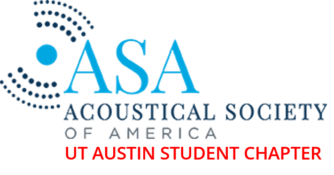The list of questions below have been suggested by acoustics grad students. If you would like to suggest an additional question and answer to be listed on this page, please reach out to the ASA chapter officers.
Q. What is the process for graduation for Masters students?
A. The process varies with the “type” of masters degree but generally takes 2 years for Thesis/Report
- Complete coursework and make sure you satisfy the department requirements (see here for Mechanical Engineering)
- Submit your Program of Work and get it approved early
- Take ME 698A/B your last two semesters
- Submit your thesis/report – You usually start writing this in your final two semesters
- Thesis templates provided by UT are available here
Most of this happens in your last year! Look for important dates in your email from the Advising Office.
You will have a mix of 2- and 3-class semesters for a 2 year timeline.
You can get a MS with Thesis during your path to PhD or independently.
- Mechanical engineering requires *6* additional courses post-MS and you cannot double-count courses for degrees
Q. What is the process for graduation for Ph.D. students?
A. The important steps for a Ph.D. are:
- Take Qualifying Exams (generally 2nd or 3rd year)
- Complete coursework (takes ~3-4 years) per the department requirements (see here for Mechanical Engineering)
- Complete your Dissertation Proposal (~1 – 1 ½ years out from graduation) and submit a Program of Work
- Apply for candidacy
- Enroll in ME X99W (Dissertation) every semester after you advance to candidacy
- Write your dissertation
- Templates provided by UT are available here
- Defend your dissertation
The timeline varies, with an average of ~5 years.
A useful reference in the Mechanical Engineering Doctoral Degree Checklist.
Q. What are Quals and when do I need to worry about them?
A. Quals (or “Qualifying Exams”) are a requirement for continuation in the PhD program. If you are doing an MS only, you don’t need to worry about these.
- The mechanical engineering acoustics program takes an old-school approach to quals:
- A written exam consisting of four sub-exams in Math, Physical Acoustics, and two others of your choice (Transducers, Ultrasonics, Nonlinear Acoustics, Architectural, Nonlinear Acoustics, Transducers, Ultrasonics, or Underwater Acoustics)
- Oral examination
- Graduate understanding of graduate-level coursework, versus graduate understanding of undergrad coursework
- Students usually take these after their second or third year. Talk with your advisor about when you should take these.
Q. What is the Prospectus / Dissertation Proposal?
A. When approximately 1-1.5 years from graduation (as determined by the student and their advisor), the student will select the members of their committee. The committee will then meet for a ~1-hour presentation of the students completed and planned dissertation work. Following this meeting, the student can submit their Program of Work and apply for Ph.D. candidacy.
Q. How can I get to campus?
A. The three main options are:
- Bike or walk
- Lock up in front of ETC
- Not much risk of theft
- Bus
- Free for UT Students by using your Student ID!
- Use CapMetro Trip Planner (NOT the text system) for accurate times and plan your route
- Drive
- Pay for parking (Pass, Occasional Parking Program, City spots)
- The “A” pass is the most affordable option available to graduate students, especially those who need a pass just for ARL
- The Occasional Parking Program allows graduate students to park in any garage for $5/day
- Park on nearby neighborhood streets for free or “roll the dice” in some locations near campus
- Pay for parking (Pass, Occasional Parking Program, City spots)
Q. Where can I sit on campus and work?
A. Here are some examples of open spaces:
- The ETC 6th floor acoustics lab is a great place for collaborative work due to the large blackboard. There are multiple open desks in that lab.
- Desk space in the 3rd and 4th floor ETC acoustics labs is available based on seniority and demonstrated need to use experimental equipment
- UT ME has open desk space (for temporary/occasional use) in ETC 3.140. This room will have lockers and a separate communal student lounge space with a refrigerator, sink, and microwave is in the works.
- The campus libraries (McKinney Engineering Library in EER 1.706, PCL, and PMA library in PMA 4.200) have open seating, whiteboards, computers, and quiet workspace
- Natural sciences library in the belltower!
Q. Where can I get software?
A. See a list of useful software links here on the student chapter website.
Q. Where can I print?
A. You can print in black and white at UT Print Kiosks that you’ll find on the 3rd floor of ETC and scattered about other buildings.
- Any library will also have printers.
- Color printing is available at PCL, PMA, Architecture and Planning, Fine Arts, and Walter Geology Libraries.
- For free printing, the 3rd and 6th floor lab/work spaces have black and white printers
Q. Where can I get food or coffee on campus?
A. For on-campus locations:
- O’s Campus café: Has hot meals, meals to go, grab-and-go snacks, and coffee
- William Powers Student Activities Center: Longhorn Coffee Co., One Two Three Sushi, Pop Up Kitchen: Sub Sandwiches
- Student Union: Chick-fil-A, Tower Burgers and Fries, Panda Express, Union Coffee House, Shake Smart
- Gregory Gym: Shake Smart
- Etter-Harbin Alumni Center: Texas Espresso
